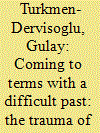| Srl | Item |
| 1 |
ID:
123127


|
|
|
|
|
| Publication |
2013.
|
| Summary/Abstract |
This paper takes as its subject the question of why some nations are less willing to acknowledge past atrocities. To answer that question, it focuses on the assassination of Hrant Dink - a Turkish-Armenian journalist - and its repercussions on Turkish national identity. Scrutinising newspaper articles written before and after the assassination (2004-2007), it casts a detailed glance at the struggle between two carrier groups - pro- and anti-acknowledgement groups - and argues that the assassination increased the likelihood of the acknowledgement of the mass killing of Armenians in 1915 by creating a cultural trauma informed by collective guilt. However, the relief generated by the funeral, combined with the strength of the master commemorative narrative regarding the mass killings, decreased that likelihood, and despite the huge public reaction created by the assassination there was no attempt at acknowledgement. As such, the paper contributes to our understanding of the trauma of perpetrators and claims that, in addition to other factors listed by earlier studies, cultural trauma is a necessary but not a sufficient condition for coming to terms with difficult pasts.
|
|
|
|
|
|
|
|
|
|
|
|
|
|
|
|
| 2 |
ID:
157512


|
|
|
|
|
| Summary/Abstract |
Previous studies adopting the collective vulnerability approach have shown that condemnation of war atrocities is grounded in communal experiences of victimization and is strongest in locations where victimization was spread across ethnic boundaries. Based on a representative survey conducted in 2006 (N = 2,012) across the former Yugoslavia, we find a similar pattern for acceptance of collective guilt. While personal victimization does not have a significant impact, the acceptance of guilt is strongest in more war-affected regions. Moreover, the results show the importance of the type of communal-level victimization: acceptance of guilt is lowest in regions marked by asymmetric violence and highest in regions marked by symmetric violence. Our findings suggest that collective victimization should not be treated as a uniform phenomenon and challenge the assumption that rejection of in-group guilt is an inevitable outcome of collective victimization.
|
|
|
|
|
|
|
|
|
|
|
|
|
|
|
|